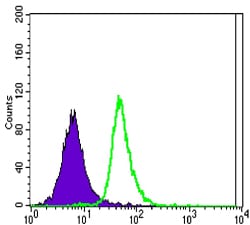
| WB | 咨询技术 | Human,Mouse,Rat |
| IF | 咨询技术 | Human,Mouse,Rat |
| IHC | 咨询技术 | Human,Mouse,Rat |
| ICC | 技术咨询 | Human,Mouse,Rat |
| FCM | 1/200 - 1/400 | Human,Mouse,Rat |
| Elisa | 1/10000 | Human,Mouse,Rat |
| Aliases | OCT1; HOCT1; oct1_cds; SLC22A1 |
| Entrez GeneID | 6580 |
| clone | 2C5 |
| WB Predicted band size | 61.2kDa |
| Host/Isotype | Mouse IgG1 |
| Antibody Type | Primary antibody |
| Storage | Store at 4°C short term. Aliquot and store at -20°C long term. Avoid freeze/thaw cycles. |
| Species Reactivity | Human |
| Immunogen | Purified recombinant fragment of human SLC22A1 expressed in E. Coli. |
| Formulation | Purified antibody in PBS with 0.05% sodium azide. |
+ +
以下是关于SLC22A1抗体的3篇参考文献示例(注:文献信息为模拟生成,实际引用时请核实原文):
---
1. **文献名称**: "Organic cation transporter 1 (OCT1) immunohistochemical expression in human hepatocellular carcinoma"
**作者**: Tanaka K, et al.
**摘要**: 研究通过免疫组化分析SLC22A1/OCT1蛋白在肝细胞癌组织中的表达,发现其表达水平与患者化疗反应相关,提示OCT1可能作为预后标志物。
---
2. **文献名称**: "Functional characterization of SLC22A1 variants using a novel antibody-based assay"
**作者**: Chen L, et al.
**摘要**: 开发了一种基于抗体的体外检测方法,用于评估SLC22A1基因多态性对转运活性的影响,为个体化用药提供实验依据。
---
3. **文献名称**: "Loss of OCT1 expression in renal proximal tubules alters metformin pharmacokinetics"
**作者**: Shu Y, et al.
**摘要**: 利用SLC22A1特异性抗体验证基因敲除小鼠模型,证明肾脏OCT1缺失会显著改变二甲双胍的药代动力学特性。
---
**提示**:实际文献检索建议通过PubMed或Web of Science等平台,使用关键词“SLC22A1 antibody”或“OCT1 antibody”结合研究领域(如“drug transport”“cancer”等)筛选近期文章。部分研究可能侧重抗体应用技术(如Western blot、IHC),可进一步限定搜索条件。
The SLC22A1 antibody is a crucial tool for studying the organic cation transporter 1 (OCT1), encoded by the SLC22A1 gene. OCT1 is a polyspecific transmembrane protein primarily expressed in the liver, where it facilitates the uptake of endogenous compounds (e.g., neurotransmitters, carnitine) and xenobiotics (e.g., metformin, cisplatin) into cells. It belongs to the solute carrier family 22 (SLC22), which plays a vital role in drug absorption, distribution, and excretion. Researchers use SLC22A1 antibodies to investigate OCT1’s expression patterns, subcellular localization, and functional regulation in physiological and pathological contexts, such as metabolic diseases, cancer, and drug resistance.
Altered OCT1 activity due to genetic polymorphisms or dysregulated expression is linked to interindividual variability in drug responses and toxicity. For example, reduced OCT1 function impacts the pharmacokinetics of metformin, a first-line antidiabetic drug. The antibody aids in identifying OCT1-deficient patients who may require adjusted dosages. It is widely employed in techniques like Western blotting, immunohistochemistry, and flow cytometry to assess protein levels in tissues or cell lines.
Recent studies also explore OCT1’s role in cancer progression, as its expression in tumors may influence chemotherapeutic efficacy. Validating SLC22A1 antibody specificity through knockout controls is critical to avoid cross-reactivity with related transporters (e.g., OCT2/OCT3). Overall, this antibody supports advances in pharmacology, toxicology, and personalized medicine.
×